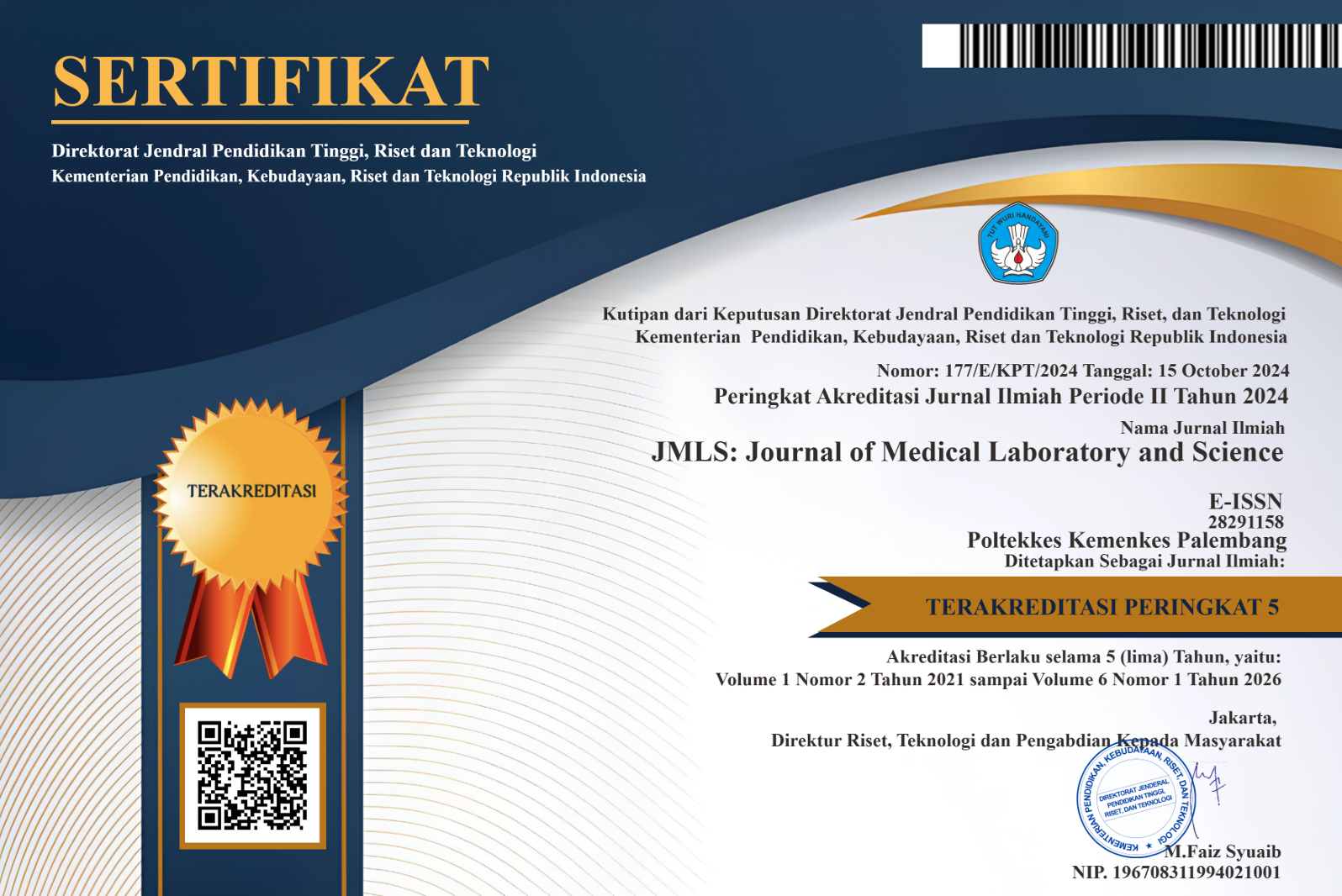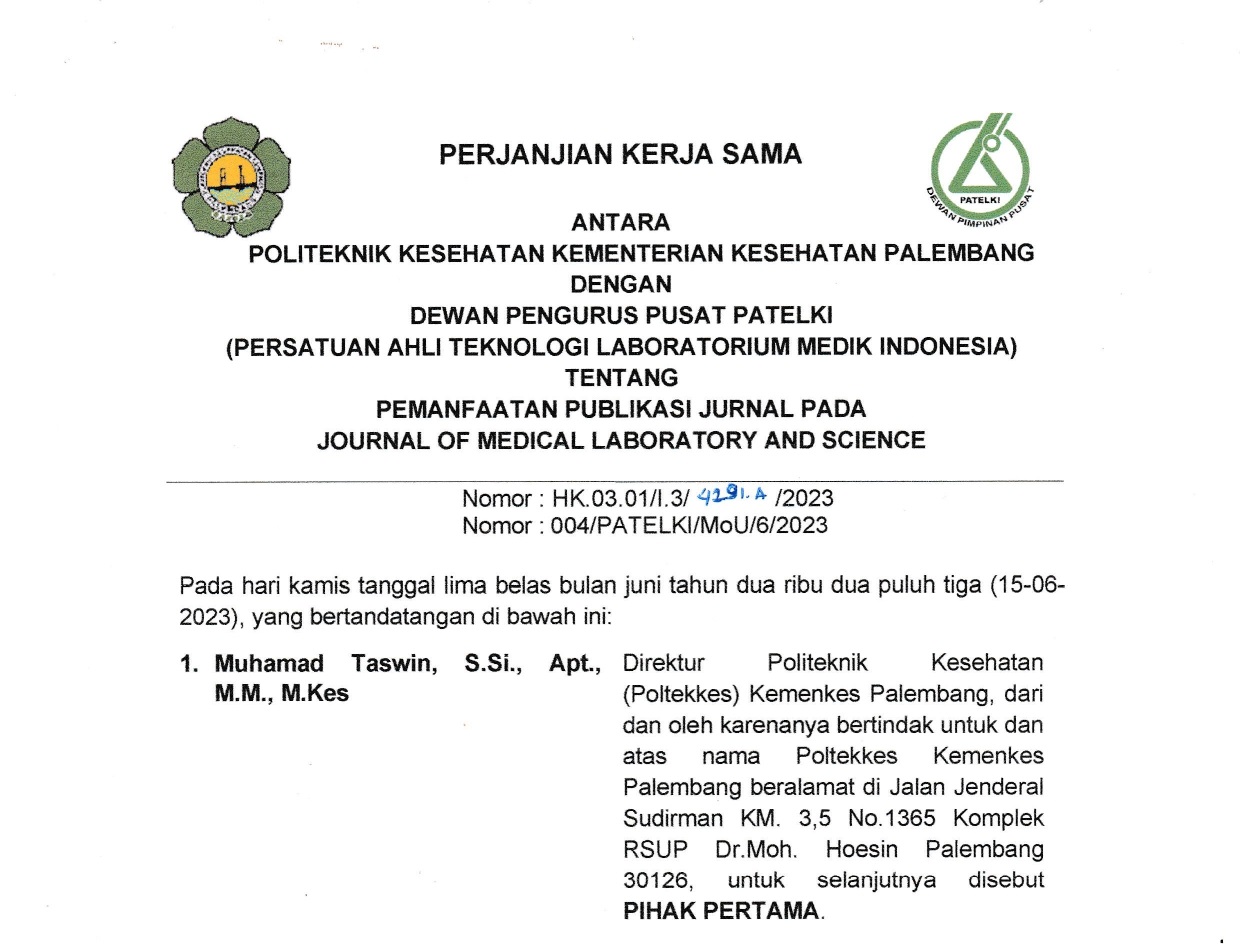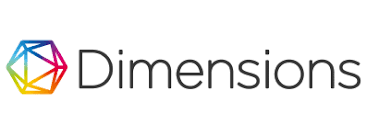EFEK KONSUMSI SUPLEMEN VITAMIN C TERHADAP KADAR GLUKOSA DARAH PUASA MAHASISWA TEKNOLOGI LABORATORIUM MEDIS POLTEKKES PALEMBANG
Abstract
ABSTRAK
Latar Belakang: Antioksidan adalah zat yang diperlukan tubuh untuk menetralisir radikal bebas dan mencegah kerusakan yang ditimbulkannya serta menghambat terjadinya reaksi berantai dari pembentukan radikal bebas yang menyebabkan stress oksidatif. Vitamin C merupakan antioksidan yang baik dan bermanfaat dalam menghambat aktivitas radikal bebas. Vitamin C memiliki struktur yang sama seperti glukosa sehingga vitamin C dapat menggantikannya dalam proses glikolisis nonenzimatik sehingga dapat menurunkan kadar glukosa. Tujuan penelitian untuk mengetahui efek konsumsi suplemen vitamin C terhadap kadar glukosa darah puasa mahasiswa Teknologi Laboratorium Medis Poltekkes Palembang. Metode:Penelitian ini bersifat analitik observasional dengan pendekatan Cross Sectional. Penelitian dilaksanakan di Laboratorium Kimia Klinik Jurusan Teknologi Laboratorium Medis Poltekkes Palembang. Sampel penelitian sebanyak 31 sampel yang mana responden diberikan suplemen vitamin C dengan dosis 1000 mg/hari selama 14 hari. Teknik sampling yang digunakan adalah simple random sampling. Analisis data menggunakan T-dependen. Hasil:Rata – rata kadar glukosa darah puasa sebelum konsumsi suplemen vitamin C sebesar 75 mg/dL sedangkan rata – rata kadar glukosa darah puasa setelah konsumsi suplemen vitamin C sebesar 78 mg/dL. Dari hasil uji T-dependen didapat hasil p > α (0,05), yaitu p value = 0.225. Kesimpulan:Tidak ada pengaruh konsumsi suplemen vitamin C terhadap kadar glukosa darah puasa Mahasiswa Teknologi Laboratorium Medis Poltekkes Palembang.
Kata kunci : Glukosa darah puasa, suplemen vitamin c
ABSTRACT
Background: Antioxidant is required by the body to neutralize free radicals and prevent the damage caused by them. Besides, it also inhibits chain reactions from forming free radicals that cause oxidative stress. Vitamin C (ascorbic acid) is a good antioxidant for inhibiting free radical activities. Vitamin C has the same structure as glucose so that vitamin C can replace it in the non-enzymatic glycolysis process to reduce glucose levels. Objective: To determine the effect of vitamin C supplement consumption on fasting blood glucose levels in medical laboratory technology students of Palembang Health Polytechnic in 2021. Methods: This study was observational analytic research with a cross-sectional approach. The research was conducted at the Clinical Chemistry of Laboratory Medical Laboratory Technology, Health Polytechnic of Palembang. Thirty serum samples of the students were taken as research samples. Respondents were given vitamin C supplements at a dose of 1000 mg/day for 14 days. The sampling technique used was simple random sampling. The data were analyzed by a T-dependent test. Results: The average fasting blood glucose level before taking vitamin C supplements was 75 mg / dL, and the average fasting blood glucose level after taking vitamin C supplements was 78 mg / dL. From the results of the T-dependent test, it was found that p> (0.05), namely p-value = 0.225, which means there is no effect of vitamin C supplement consumption on fasting blood glucose levels of the students of Medical Laboratory Technology, Health Polytechnic of Palembang. Conclusion: There is no effect of vitamin C supplement consumption on fasting blood glucose levels of the students of Medical Laboratory Technology, Health Polytechnic of Palembang.
Keywords : Fasting Blood Glucose, Vitamin C Supplements
Copyright (c) 2022 Journal of Medical Laboratory and Science

This work is licensed under a Creative Commons Attribution-ShareAlike 4.0 International License.
Authors who publish with this journal agree to the following terms:
- Authors retain copyright and grant the journal right of first publication with the work simultaneously licensed under a Creative Commons Attribution License that allows others to share the work with an acknowledgement of the work's authorship and initial publication in this journal.
- Authors are able to enter into separate, additional contractual arrangements for the non-exclusive distribution of the journal's published version of the work (e.g., post it to an institutional repository or publish it in a book), with an acknowledgement of its initial publication in this journal.
- Authors are permitted and encouraged to post their work online (e.g., in institutional repositories or on their website) prior to and during the submission process, as it can lead to productive exchanges, as well as earlier and greater citation of published work














